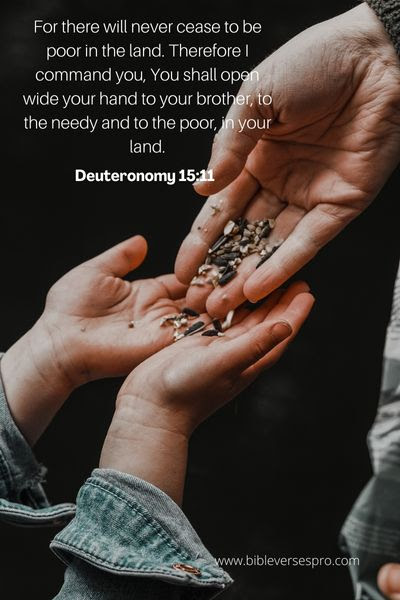Table of Contents Show
According to the Bible, giving is always more of a blessing than receiving. Christians ought to always donate to the poor and homeless. God values the spirit of giving.
Christians are expected to love and be kind to everyone, including their enemies. How is God’s love in us if we have something and a poor man asks for it, but we don’t give it to him?
Bible Verses for Giving to the Poor
Consider this. When it comes to someone other than ourselves, we have enough money to buy our favorite treats, rent a DVD, and indulge in items, but this becomes problematic.
Selfishness begins to take over when it comes to other people. We are instructed to emulate Christ. When Christ died on the cross, was He simply thinking of Himself? No!
God has given you a chance to benefit someone else. These 19 Bible Verses for giving to the poor make it abundantly clear that God will also bless you when your heart is set on rewarding others.
Proverbs 19:17- Lend to the Lord
Whoever is generous to the poor lends to the Lord, and he will repay him for his deed.
Proverbs 19:17

We aren’t wasting money when we contribute to the needy as a sign of our love and compassion for them. It’s comparable to giving cash to the Lord.
The kind and just Creator assumes their debt on their behalf, and he will fully pay us back for giving to the poor.
Hebrews 13:16 – Share with the Poor
Do not neglect to do good and to share what you have, for such sacrifices are pleasing to God.
Hebrews 13:16

Do not neglect to do good and share what you have – These are continuous sacrifices that God requires and will spring from a sense of God’s love in Christ Jesus. For God’s sake, gratitude for God’s immeasurable gift and acts of goodwill are shown to people.
If a man lacks love and charity for his neighbor, no reliance—not even on the infinitely meritorious sacrifice of Christ—can be acceptable in God’s eyes. The gifts that every sincere follower of Christ must make, along with acts of kindness and mercy toward people, indicate that a person belongs to Christ.
Luke 6:38 – Give for manifold blessings
“Give, and it will be given to you. Good measure, pressed down, shaken together, running over, will be put into your lap. For with the measure you use it will be measured back to you.”
Luke 6:38

Jesus effectively explains the adage “give, and it will be given to you” in this verse. A kind person will not only profit from the kindness and generosity of others, but they will also “pour into your lap a good measure-pressed down, shaken together, and running over,” according to what Christ teaches.
The ministry we are involved in should reflect the selfless grace, compassion, and kindness that Christ has shown towards us, in that Jesus died for us while we were still sinners. Love is demonstrated by giving oneself to others. He was really “excellent measure-pressed down, shaken together, and flowing over” in his generosity to us.
Acts 20:35 – Help the Poor
In all things I have shown you that by working hard in this way we must help the weak and remember the words of the Lord Jesus, how he himself said, “It is more blessed to give than to receive.”
Acts 20:35

When we reflect on what Jesus meant when He stated it is more blessed to give, we realize that our giving must be done practically with resources and money as well as spiritually and emotionally. God commands everyone to manage their finances prudently for the gospel’s spread and to aid the weak, vulnerable, widowed, and orphaned.
Giving kills our ego, removes the love of money, and feeds our mission to serve others in need, making it more blessed to give than to receive.
We don’t need to look for anything in return when we donate because Christ has provided everything we need. As Jesus stated in Luke 9:23, we become joyful or blessed when we take up our cross and deny ourselves.
2 Corinthians 9:7 – Give to the Poor Willingly
Each one must give as he has decided in his heart, not reluctantly or under compulsion, for God loves a cheerful giver.
2 Corinthians 9:7

The essential point of 2 Corinthians 9:7 is that giving should be self-directed and motivated by joy. It needs to originate from the heart. Paul talks about monetary giving, but generous and joyful giving extends beyond financial giving.
Serving our fellow human beings is another way to provide. Is there a more effective method to learn to contribute voluntarily and joyfully than to emulate Jesus? Jesus never once voiced resentment for the suffering he underwent.
Our heavenly Father delights in bestowing valuable gifts upon his children. God wants his offspring to have the exact nature as himself. Giving with joy is how God’s grace is shown through us.
1 John 3:17 – Help someone in need
But if anyone has the world’s goods and sees his brother in need, yet closes his heart against him, how does God’s love abide in him?
1 John 3:17

This passage makes it evident that as God’s children, we should emulate our Savior in our behavior and attitudes. We are to be a generation of light and salt in a sick and dark world.
We are commanded to pray for those who harm us, bless those who insult and persecute us, assist the unfortunate, and comfort the grieving.
If we are blessed with the things of this world, we should happily provide for others in need. If we notice a fellow believer in need of any type, we should act to meet that need rather than ignore his issue or close our hearts to his suffering.
1 Timothy 5:8 – Strive to feed your family
But if anyone does not provide for his relatives, and especially for members of his household, he has denied the faith and is worse than an unbeliever.
1 Timothy 5:8

The stewardship ethic that permeates the Old and New Testaments starts within the individual (2 Thessalonians 3:10) and radiates outward from there. God created the world with the idea that caring for one’s family comes first among other levels of obligation. We are a family, and as members of the body of Christ, we should be kind to those in our midst.
The Lord protects and upholds widows and orphans throughout God’s Word. He is “a protector of widows, a father to the fatherless.” Scripture has long called for justice, love, and assistance for widows and orphans (Deuteronomy 10:18; 27:19; Psalm 140:12). God demands that His followers help and defend the vulnerable.
Matthew 5:42 – Dont refuse to borrow the poor
Give to the one who begs from you, and do not refuse the one who would borrow from you.
Matthew 5:42 ESV

We are only exempt from the general principle of freely lending and giving to everyone in need if we cannot carry it out. Giving and lending are two charitable obligations that Christ unites and places on an equal basis.
God is the same God from whom we beg for our daily bread. How dare we refuse him? God uses the hand of the beggar to ask for our charity.
Let us be mild and compassionate when nothing is left to be done. If we are unable or unwilling to help a poor man, let us never speak ill of him or cast him a derogatory glance.
2 Corinthians 8:12 – Be ready to help the poor
For if the readiness is there, it is acceptable according to what a person has, not according to what he does not have.
2 Corinthians 8:12

Paul first applied the enormous and manifestly right and equitable concept to the obligation to give charity. But it applies just as equally to all of the commitments we have to God. He demands a ready mind and a heart prepared to submit to authority. Our assistance should be selfless and genuine, limited to what we can provide.
God expects us to serve him alone by our capacity and to be evaluated on that basis. God accepts any service offered to him that is done to the best of one’s capacity. Although the poor widow could not donate as much as the rich man, her donation was accepted and might even be more critical because it would help the widow.
Bible Verses about the rich giving to the poor
God’s desire for His children to have compassion for the weak and needy may be seen in the Old and New Testaments. The impoverished, according to Jesus, will always be with us. Additionally, He claimed that those who are merciful to the hungry, sick, and poor are ministering to Him personally, and they will be blessed as a result.
There is no denying that poverty has a significant and negative impact. Because God’s demands for us to care for the poor are interwoven throughout the Scripture, God’s people cannot be indifferent toward those in need.
Deuteronomy 15:11 – The Poor will always be among you
For there will never cease to be poor in the land. Therefore I command you, You shall open wide your hand to your brother, to the needy and to the poor, in your land.
Deuteronomy 15:11

Open your hands to the poor and needy because there will always be a need on the planet; no amount of vigilance or hard labor on our behalf will be able to end it. As a result, God invites us to participate with Him in the continuing provision of one another’s needs. The path to freedom and trust is this one.
The covenant is based on generosity and compassion. The Lord, your God, will bless you in all you do if you give generously and without complaint. Only when our work benefits others does it receive its full blessing. Love, in Paul’s words, “fulfills the law” (Rom. 13:10).
Deuteronomy 26:12
When you have finished paying all the tithe of your produce in the third year, which is the year of tithing, giving it to the Levite, the sojourner, the fatherless, and the widow, so that they may eat within your towns and be filled.
Deuteronomy 26:12
The verse demonstrates that donating should be done with a good heart. God wants us to give, but He also wants us to live with the correct attitude. Giving correctly is done by God’s Word. Genuinely setting aside what is meant to be offered to the LORD is faithful giving. Giving properly means doing so without anticipating anything in return besides God’s blessings.
Luke 12:33
“Sell your possessions, and give to the needy. Provide yourselves with moneybags that do not grow old, with a treasure in the heavens that does not fail, where no thief approaches and no moth destroys.”
Luke 12:33
Sell your possessions and give alms: The mandate to give away everything we own is a litmus test for discipleship and a means of disciplining us. Giving is considered a cure or treatment for covetousness.
Genuine conversion, unshakable loyalty to Jesus, and firm faith in Him are all demonstrated by a willingness to heed the call to renunciation.
Luke 3:11
And he answered them, “Whoever has two tunics is to share with him who has none, and whoever has food is to do likewise.”
Luke 3:11
In this stanza, John responds to the people’s query by demanding that they share, be fair to one another, refrain from being rude or cruel, and be content with what they have. These are the lessons we impart to our youngest learners.
Why can’t adults follow our advice and provide an excellent example for our kids if we teach them to be kind, generous, and fair? He has shown you, O man, what is good; and what does the LORD require of you but to do justly, to love mercy, and to walk humbly with your God? (Micah 6:8)
Proverbs 14:31
Whoever oppresses a poor man insults his Maker, but he who is generous to the needy honors him
Proverbs 14:31 ESV
Being a good Christian and treating the poor poorly is impossible. Whether you sing “Oh, how I love Jesus” is irrelevant. It makes no difference if you go to church to feign worship. Serving the poor is the only true religion in God’s eyes, always open. The adage clarifies that proper reverence for God entails kindness to the needy.
Some believe accepting Jesus into their hearts is the prerequisite, proof, and illustration of eternal life. However, the only verse in the Bible that utilizes terminology similar to this does not refer to eternal life (Rev 3:20). By giving to the needy and spending money on them; you provide the best evidence and proof of eternal life.
Bible Verse about giving to the poor and not boasting
God, who created and supported, and renewed us, is at the center of life and is why we have many reasons to be thankful for it. Not only can we provide people’s needs with financial support, but also with our time, talents, and knowledge. When we spread the good news of God’s kingdom, we do not praise our goodness but rather the love of God.
What God wants us to do with the things He has given us is at the center of our discipleship. Serving others entails responding to those we encounter along the journey with selfless love, just as Jesus would have. In comparison to when Jesus said these things to the temple show-offs, there are many more needy individuals in the world now.
Matthew 6:1
“Be careful not to do your ‘acts of righteousness’ before men, to be seen by them. If you do, you will have no reward from your Father in heaven.
Matthew 6:1
In this verse, we are prompted to ask, “Are you doing this for God’s reward, or are you doing it to assist others in acquiring more followers and likes on your Instagram, TikTok, or Facebook?”
Christ’s advice to His disciples is stern: “Beware of performing your righteousness before men to be seen by them.” Jesus is urging us to assist the needy without boasting.
Most people in this day of social media tend to show off their acts of generosity so that others might see them. Jesus is reminding us that we shouldn’t display our kindness in front of people because they will reward us with likes or comments, but if we show generosity to others in secret, God, who is in heaven, will reward us.
Matthew 6:2-4
So when you give to the needy, don’t announce it with trumpets like the hypocrites do in the synagogues and on the streets to be honoured by men. I tell you the truth, they have received their reward in full! But when you give to the needy, don’t let your left hand know what your right hand is doing, so that your giving may be in secret. And your Father who sees what is done in secret will reward you.”
Matthew 6:2-4
Rather than making a reputation for ourselves, assisting others is to exalt the name of the Lord. We are to let our light shine not for our glory but for God’s honor. Jesus forbids making a show of your charitable contributions. These givers are labeled as hypocrites by him.
Jesus does not claim that donating merely for the benefit of others will bring no reward. It does. Being regarded as generous by others makes you feel good. But that is the only compensation we will get, and it will pass quickly. If we donate to assist others in pleasing our heavenly Father, the reward can be much higher.
Proverbs 25:14
Like clouds and wind without rain Is a man who boasts of his gifts falsely.
Proverbs 25:14
Most men love to talk the talk; they readily admit their generosity and kindness without being prodded but finding a devoted man who lives up to his words can be challenging. The only sober truth on earth, the gospel of Jesus Christ, vehemently condemns people who make promises to the underprivileged but do not follow through on them.
Performance, not consoling words or promises, is the actual test of charitable and generous behavior. Instead of giving folks who need help cheap and easy discourse that raises their expectations, silently give a meaningful present or render a valuable service that endangers their need for support.
1 Corinthians 13:4
Love is patient and kind; love does not envy or boast; it is not arrogant.
1 Corinthians 13:4 ESV
The first two manifestations of love that Paul offers to this unspiritual group are patience and long-suffering in the face of adversity and a kind that puts the needs of others first. When we think about this text, let’s dig a little deeper to understand its actual meaning and pray fervently for Christ to be created so that we can love others as He loves us.
Matthew 6:2
“So when you give to the poor, do not sound a trumpet before you, as the hypocrites do in the synagogues and in the streets, so that they may be honored by men. Truly I say to you, they have their reward in full.
Matthew 6:2
When Jesus was alive, it was common for people to advertise their charitable contributions to be seen as philanthropic. Nowadays, people still know how to draw attention to their giving even when they don’t blow a trumpet to present the image of generosity.
Jesus advises the person who donates so he might hear others’ applause to take pleasure in it because that is the only compensation he will receive. The person who did it to obtain an earthly reward will not receive a prize in paradise.
Let us help in secret that even you are hardly aware that you are doing anything at all praiseworthy. Allow God to be present, and his presence is enough.
Conclusion
The Law was believed to oblige the Jewish people to practice charity as one of their obligations. Jesus rebuked the “hypocrites” who flaunted their charitable acts to impress others with their generosity.
In the Kingdom of God, rewards come from connection with God and his children and life-giving relationships rather than material possessions or status. These benefits are offered freely and cannot be merited. Jesus fulfilled the Law and set us free to love others without condition.








